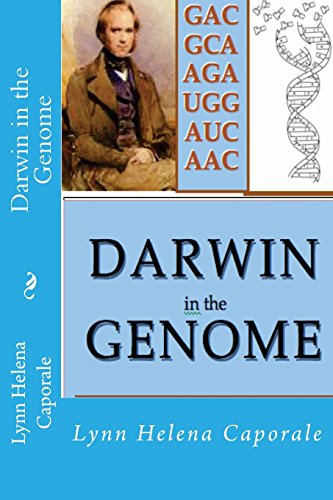Items related to Darwin in the Genome: Strategies in Biological Evolution

"synopsis" may belong to another edition of this title.
The enthralling story of strategic genomes and the revolutionary discoveries at the cutting edge of bio-research.
"Each of us is, in a way, an experiment, and an example of the life-preserving, creative diversity expressed at our moment in time by the human genome. Indeed, we share with each other, no less than with the majesty of the Redwoods and the doves, the fact that each of us is a unique creation of the barely-tapped potential immanent in the first genomes on Earth."--From the Introduction
Now that we have the basic blueprint of the human genome in hand, scientists are beginning to probe more deeply into life's mysteries in ways that have never been possible before. One of the most enduring and controversial of those mysteries is how evolution by natural selection could have produced the incredibly complex life forms we see all around us. How could a process based on random mutation exhibit such powerful, seemingly progressive, principles of design? Until now, this question has been fiercely debated by those who believe that there must be an intelligent designer driving the process and those who believe that random mutation can somehow produce sufficient complexity.
But now, in this eloquent and timely book, Lynn Caporale, a molecular biologist at the forefront of genomics research, offers an exciting new theory that sees past both the ideas of a random model, and the alternative of divine intervention, to see a more subtle and intricate mechanism at work: a mechanism that looks startlingly strategic and purposeful, and yet is consistent with the basic Darwinian model. Simply put: Not all mutations are "random accidents." In the struggle for survival--from pathogens to flowers, birds to orangutans, baker's yeast to human beings--the fittest genomes are brilliant strategists, responding to, and in fact anticipating, challenges and opportunities in their environments.
Writing with elegant clarity and rigor, Lynn Caporale describes the emergence of genomic mutations strategies, spelling out some of the more profound implications of these findings, including the possibility of bold new directions for medical research, and the inherent dangers of attempting to fix perceived "errors" in a human genome, all the while stressing the importance of human diversity--and biodiversity--for survival in a world in which each of us shares 99.97% of our DNA with every "perfect stranger" on Earth.
"There was a moment when the dust itself edged, in slow motion, over a boundary into life. It entered onto a path strewn with dangers, uncertainty, and creativity. It spread its growing skill across the Earth until it learned how to fly at will, how to sit still, here, and to discuss its own evolution. Those who do not believe that we have evolved from life forms that are invisible to the naked eye--and even those who do--find it hard to conceive of how this journey could have succeeded, relying only on random mutation and survival of the "fittest." It seems most inconceivable that there has been enough time for mere molecules to organize themselves into a being that could compose music, travel to the moon and back, and indeed analyze its own genome. How did we get this far, even once, in only billions of years? How could we have happened so randomly? In the greatest achievement in human intellectual history, the information in our genome, the product of billions of years of evolution, now is opening before us. What answers does our genome hold about the Big Questions that whisper to us all? What does it say of the "immense journey" it has taken, as it passed through uncounted life forms to be carried within us, as we sit here, discussing our origins and our fate?"--From the Introduction
"About this title" may belong to another edition of this title.
- PublisherCreateSpace Independent Publishing Platform
- Publication date2014
- ISBN 10 1494211084
- ISBN 13 9781494211080
- BindingPaperback
- Number of pages256
(No Available Copies)
Search Books: Create a WantIf you know the book but cannot find it on AbeBooks, we can automatically search for it on your behalf as new inventory is added. If it is added to AbeBooks by one of our member booksellers, we will notify you!
Create a Want
